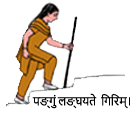When a patient is asked to use a particular medicine his first query is: 'Doctor, does this medicine have side effects?' I reply' Yes, there are, but then a disease too has its own side effects'. The misery of arthritis on one hand and fear about side-effects of drugs on other put patient in a difficult situation. Some patients do suffer from adverse drug-effects. But this is a risk that one has to take. Accident is the side effect of travelling, but then nobody stops travelling for the fear of an accident. If one has to go from place A to place B, then the direction A-B is fixed. Using the drugs proven by scientific research is that direction. It requires mental resolve and physical strength to climb the pinnacle of a mountain. Precaution is as essential as equipment for the same. Arthritis can be similarly controlled by using proper drugs in proper manner with due precautions.
Some of the drugs used in Rheumatoid arthritis are used in cancers and do have adverse effects. Inflammatory arthritis (arthritis with swollen joints) is described as Aam-vata (Vata-disease caused by Aam) in Ayurveda. Aam is described to act like a toxin (Aam-visha) in Ayurveda. Based on the principle of ‘like cures like’ it is expected that anti-rheumatic drugs can have some toxic effects. Toxin itself is the remedy of toxin. As compared to cancer, the dosages used in arthritis are very small. A patient of arthritis would take these drugs without any hesitation if he or she develops cancer instead of arthritis. We are so much afraid of cancer but are not aware of the fact that chances of developing cancer are significantly high in uncontrolled cases of inflammatory arthritis. Patients are willing to take lifelong medications for diseases like hypertension and diabetes. This is so because they are aware of the complications of these diseases. People need to be aware of complications of inflammatory arthritis. The number of medications usually goes on increasing in diseases like diabetes whereas the number and doses of medications decrease over a period of time in a well controlled arthritis. Medications, though required for indefinite time in most cases, can usually achieve effective disease control in inflammatory arthritis. Drugs are like a tool to hold a poisonous creature; if one stops taking drugs there is every chance that the disease-creature will bite again.
Treatment of inflammatory arthritis usually starts with 6-7 types of tablets. Additional tablets are required for associated diseases such as hypertension and diabetes. One of my patients asks me, 'Is there no limit to the number of tablets I have to take?' It is true that such is the case to start with and that there is no suitable alternative. A rheumatology nurse provides detailed information about the disease and drugs to patients in developed countries. She also tells him about possible adverse effects of drugs. Pharmacists, too, provide necessary information about drugs. A particular medicine is prescribed only on obtaining consent from patient. We do not have such situation in India. We take all drugs as our doctor tells us to. One should not forget that though there is happiness in ignorance it has its own hazards.
